|
|
|
Sort Order |
|
|
|
Items / Page
|
|
|
|
|
|
|
| Srl | Item |
| 1 |
ID:
171873
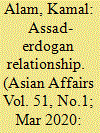

|
|
|
|
|
| Summary/Abstract |
Much has been made of the once brotherly relationship between Syrian President Bashar al Assad and the Turkish President Recep Teyep Erdogan. Indeed, this relationship formed the bedrock of Turkey's much-vaunted move towards the Arab world and its re-engagement with regions on which Ataturk and his successive Kemalist Generals had shut a door. Yet, more than fifteen years after the historic first visits by the Turkish and Syrian leaders to each other's capitals, the Syria-Turkey relationship lies in ruins. Whilst much of the focus of the war in Syria has been on the exaggerated sectarian divide in the Middle East and the great power rivalry between the United States and Russia, a key aspect overlooked is the fundamental relationship between Turkey and Syria. The last two decades of this relationship have been defined by Assad and Erdogan. As Turkey slowly begins to re-engage with Syria one can trace the tumultuous relationship between the two neighbours in the immediate aftermath of the dissolution of the Ottoman Empire. The Arab nationalists and Turkish nationalists have been at daggers drawn over the make up of the border. Syria has never forgotten the land-grab of the Turks in the aftermath of the French exit of the Levant. Furthermore, the diverse set of communities – the Greeks, the Armenians, the Kurds and the Syriacs – that make up the inhabitants of the region still suffer from the effects of the mismanagement of the French exit and what is seen by many of these communities as an illegal annexation by Turks and Arabs. However, under the Syrian Arab Republic the Christians of all denominations including the Armenians and Greeks flourished whilst Turkey forced only one identity upon its once diverse people. This article will argue that the relationship between Syria and Turkey has ebbed and flowed – and this dynamic is rooted in history where successive Turkic dynasties have favoured Syria as their pivot to control the region. Similarly, when Syria became less important, the very foundation of the Turkic and later Turkish influence became weak in the region. The close relationship between Erdogan and Assad overturned more than six decades of animosity, but once Erdogan turned his back to Assad and supported the overthrow of the Syrian government the relationship fell apart. As the end of the war nears, a defining factor to end this war will be how Turkey and Syria reconcile or interact. The Syrian Kurds now seem to be back in Assad's corner as they prefer to be under Damascus' sovereignty then under attack from Ankara across the border. The Kurdish question is of significant value to both Syria and Turkey; it has been a major reason for both countries to be at peace and war. A closer look at the history of these two countries' relationship proves that the Assad-Erdogan relationship has mirrored the history of the two states since the fall of the Ottoman Empire. Their future in more than one way is now inter-twined on how they interact with each other.
|
|
|
|
|
|
|
|
|
|
|
|
|
|
|
|
| 2 |
ID:
169231
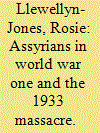

|
|
|
|
|
| Summary/Abstract |
The recent discovery of a bundle of documents in the archives of the Royal Society for Asian Affairs has shed more light on the history of the Assyrian Christians of Iraq from the time of the First World War up to the Simele massacre in 1933. The documents are accounts and correspondence written primarily by a number of leading British players including Major-General Dunsterville, Sir Henry Dobbs, Colonel J.J. McCarthy, and also the Assyrian Patriarch Mar Shimun. They also shed further light on the role played by Leo Amery, Secretary of State for the Colonies. The documents appear to have been compiled by Sir Percy Sykes, the then Secretary of the Royal Central Asian Society (as the Royal Society for Asian Affairs then was) as part of an investigation into the situation of the Assyrians. This article introduces the newly-discovered collection of documents and discusses how they advance our understanding of this period.
|
|
|
|
|
|
|
|
|
|
|
|
|
|
|
|
| 3 |
ID:
126879
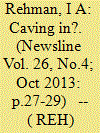

|
|
|
|
|
| Publication |
2013.
|
| Summary/Abstract |
Instead of challenging the militants religious credentials, the government appears to be capitulating to them.
|
|
|
|
|
|
|
|
|
|
|
|
|
|
|
|
| 4 |
ID:
126637
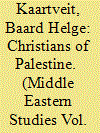

|
|
|
|
|
| Publication |
2013.
|
| Summary/Abstract |
Based on fieldwork in the Bethlehem area, this article uses the issue of internal land disputes as a starting point to describe a series of developments that have served to weaken the Christian communities in Palestine, and to identify some dilemmas they face, as Palestinians and as members of a minority community in Palestine. The article describes a situation where a weak and dysfunctional legal system under the Palestinian Authority (PA) has left Palestinians dependent on family and community networks for security and protection. Due to a history of emigration, combined with distinct social and demographic characteristics, Christian Palestinians find themselves in a position of structural vulnerability, subject to land theft and other criminal violation. Cautious about igniting sectarian divisions, Christian community leaders have a hard time addressing these issues within a public discourse. Fearful of harming Palestinian national interests, they are also reluctant to utilize international contacts and seek external support to secure their own rights and interests in Palestine. The article argues that this reflects both a commitment to an ethos of national unity among Christian Palestinians, and an acute awareness of the impact of 'framing' in preserving sectarian harmony.
|
|
|
|
|
|
|
|
|
|
|
|
|
|
|
|
| 5 |
ID:
179893
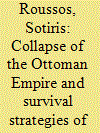

|
|
|
|
|
| Summary/Abstract |
The millet system compartmentalised religious communities into different sociopolitical environments under the overarching Ottoman imperial realm. However, during the nineteenth century, state transformation and crisis and the global re-allocation of political and economic power led to the exacerbation of ethnoreligious conflicts. Facing the collapse of the Ottoman imperium and the threat of extinction, the Greek Orthodox, Assyrian, Chaldean and Syrian Orthodox communities developed five survival strategies. The first was co-optation by state authorities; the second, protection of the Great Powers; the third armed resistance and the creation of autonomous enclaves; the fourth was that of exodus; and the last was to integrate themselves into Arab nationalism, lowering the banner of religion and becoming strong advocates of an Arab national identity encompassing Muslims and Christians alike. This paper aims to present a comparative approach to these strategies in the period from the beginning of the twentieth century to the formation of the Mandates
|
|
|
|
|
|
|
|
|
|
|
|
|
|
|
|
| 6 |
ID:
091171
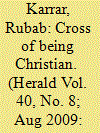

|
|
|
| 7 |
ID:
137178
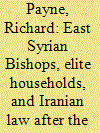

|
|
|
|
|
| Summary/Abstract |
This article is an exploration of the interconnected legal ties between Christians and Zoroastrians in the early Islamic era. Drawing from the writings of the Christian authors Ishobokt, Simeon, and Henanisho, Payne describes how East Syrian bishops appropriated laws of marriage, inheritance, and property from Iranian jurisprudential traditions as a means of transferring wealth intergenerationally and extending their judicial authority. Payne thus explores the ways in which the Christians of Iran were influenced by the Iranian legal system and culture and in the seventh century CE.
|
|
|
|
|
|
|
|
|
|
|
|
|
|
|
|
| 8 |
ID:
183993
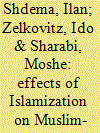

|
|
|
|
|
| Summary/Abstract |
This article examines the effects of Islamisation processes among Israeli Muslim Arabs on their intercommunal relations with Christian Arabs before and after the ‘Arab Spring’, based on 45 in-depth interviews held prior to and after this momentous event. The findings show the complex role played by Islamisation in Muslim-Christian relations, causing tensions and distancing at times while promoting intercommunal cooperation on other instances. They also reveal that in addition to the Islamic Movement, three other main socio-religious subsets played a role in Islamisation: secular, traditional and Salafi. Finally, since the onset of the ‘Arab Spring’, the religious identity of Israeli Muslims has remained central but the power of Islamic segments seems to have declined. Under these circumstances, Muslims and Christians tended to grow socially distant from each other, though no substantial tensions were evident.
|
|
|
|
|
|
|
|
|
|
|
|
|
|
|
|
| 9 |
ID:
115432
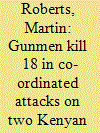

|
|
|
| 10 |
ID:
158942
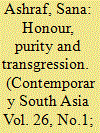

|
|
|
|
|
| Summary/Abstract |
Since the incorporation of anti-blasphemy laws protecting the religious sentiments of the Muslim majority in the Pakistan Penal Code in the 1980s, Pakistan has seen several cases of extra-judicial killings, mob violence and vigilante action against the accused. Based on my fieldwork in Punjab, Pakistan, this paper deals with the meanings associated with blasphemy, and violent action that follows the accusations. Focusing on everyday interactions at a local level, I argue that certain understandings of the notions of honour, shame, purity, and transgression provide meaning as to what constitutes blasphemy and what are desirable courses of action to be taken in response to perceived blasphemy. I further demonstrate how public religious discourse is utilized to mobilize people, by actively legitimizing violence in the name of love, and framing as the hero – a true Muslim – one who can kill for the sake of love and hence is capable of preventing shame by defending the Prophet’s honour.
|
|
|
|
|
|
|
|
|
|
|
|
|
|
|
|
| 11 |
ID:
161457
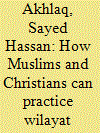

|
|
|
| 12 |
ID:
161639
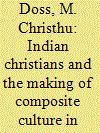

|
|
|
|
|
| Summary/Abstract |
While North India erupted in rebellion in 1857, South India was experiencing a range of cross-cultural contests between missionary Christianity and local converts, who protested against Indian culture being dismissed as a work of the devil. Converts in the emerging Christian communities, particularly in South India, made efforts to retain their indigenous cultural ethos as part of their lived experience. Early attempts to balance Indian identity with Christian beliefs and practices were later replicated in a second anti-hegemonic movement by claims of Indian Christians for respectful inclusion into the new composite nation of postcolonial India.
|
|
|
|
|
|
|
|
|
|
|
|
|
|
|
|
| 13 |
ID:
134357
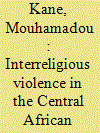

|
|
|
|
|
| Summary/Abstract |
The outbreak of violence following the insurgency by a coalition of armed groups called Séléka represents one of the darkest pages in the contemporary history of the Central African Republic (CAR). Although the country has experienced chronic instability since independence from France in 1960, it has never before descended into the current near-genocidal situation, which has pitted Muslims against Christians. The CAR has been embroiled in conflict since March 2013, with unprecedented security and humanitarian consequences. In December 2013, the United Nations representative for the first time described the situation as an alarming security threat and evoked the likelihood of genocide and humanitarian disaster if nothing is done.
|
|
|
|
|
|
|
|
|
|
|
|
|
|
|
|
| 14 |
ID:
119729
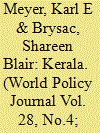

|
|
|
|
|
| Publication |
2011.
|
| Summary/Abstract |
Thiruvananthapuram, India-Rarely does the Indian state of Kerala capture the world's attention. It did so in July when a Hindu temple in its state capital was found to contain a royal ransom of solid gold statues and coconuts, piled together in a sealed vault along with sacks of diamonds. The treasure's value is estimated at $22 billion, which likely makes the temple the richest in South Asia. Still, having recently visited Kerala, a splinter of land at India's southwestern tip, we wondered whether the excited accounts of the discovery obscured a more relevant and remarkable story.
|
|
|
|
|
|
|
|
|
|
|
|
|
|
|
|
| 15 |
ID:
161408
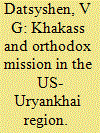

|
|
|
| 16 |
ID:
025217
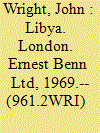

|
|
Libya
/ Wright, John
|
1969

|
|
|
|
| Publication |
London, Ernest Benn Ltd, 1969.
|
| Description |
304p.: ill.hbk
|
| Series |
Nations of the Modern World
|
|
|
|
|
|
|
|
|
|
|
|
Copies: C:1/I:0,R:0,Q:0
Circulation
| Accession# | Call# | Current Location | Status | Policy | Location |
| 002758 | 961.2/WRI 002758 | Main | On Shelf | General | |
|
|
|
|
| 17 |
ID:
119603
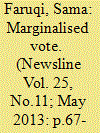

|
|
|
| 18 |
ID:
170473
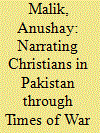

|
|
|
|
|
| Summary/Abstract |
The discussion of Christians in Pakistan usually starts off with them being viewed as a besieged minority without agency which was marginalised further as Pakistan became more ‘Islamic’ through official legislation, particularly under the regime of General Zia ul-Haq in the 1980s. This article attempts to historicise this narrative by focusing on the 1950s and 1960s. It argues that in the early years of Pakistan’s existence, Christians narrated themselves as being important for the very formation of Pakistan and believed that a more equal citizenship was possible, but the environment of political repression under General Ayub Khan, and the war with India in 1965, quickly closed off such possibilities.
|
|
|
|
|
|
|
|
|
|
|
|
|
|
|
|
| 19 |
ID:
179396
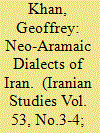

|
|
|
|
|
| Summary/Abstract |
Spoken vernacular dialects of Aramaic, generally known as Neo-Aramaic dialects, have survived down to modern times in various regions of the Middle East and can be divided into various subgroups. There are some islands of Neo-Aramaic in the West of Iran, which are situated on the eastern periphery of the Neo-Aramaic area. These include dialects spoken by Christians and Jews belonging to the North-Eastern Neo-Aramaic subgroup in the West Azerbaijan, Kordestan and Kermanshah provinces and Neo-Mandaic spoken by Mandaeans in the Khuzestan province. This paper examines a number of distinctive features of the Neo-Aramaic dialects of Iran, including those that have been induced by contact with other languages in the area.
|
|
|
|
|
|
|
|
|
|
|
|
|
|
|
|
| 20 |
ID:
101639
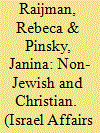

|
|
|
|
|
| Publication |
2011.
|
| Summary/Abstract |
This paper focuses on a specific group of post-1989 Former Soviet Union (FSU) migrants in Israel, those who prefer to keep their Christian religion in a country with an explicitly Jewish character. Specifically, we focus on (1) immigrants' perceptions of state and institutional discrimination against non-Jewish immigrants, and (2) immigrants' construction of social distance and social boundaries across ethno-cultural groups. Our findings suggest that Christian immigrants challenge the hegemonic definition of who is a Jew, strongly contest the Israeli ethno-national regime of incorporation that discriminates against non-Jewish citizens, and advance claims for equal rights. Religion becomes the most important marker for identity construction. Shared national background (country of origin) does not necessarily guarantee solidarity and cordial social relations between immigrants.
|
|
|
|
|
|
|
|
|
|
|
|
|
|
|
|
|
|
|
|
|